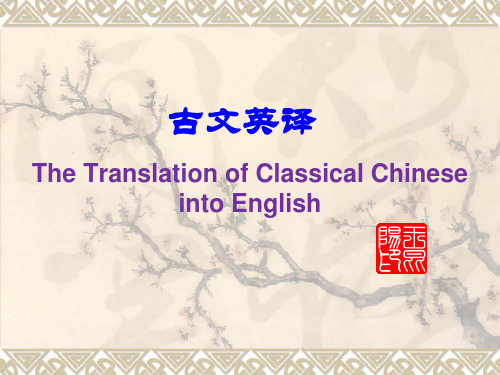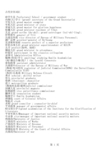古文称谓英译
古文英译

(一)汉语文言与现代英语句法结构的主要相似 点及其翻译 1、文言判断句与英语SVC句型 2、文言被动句与英语的被动句 (二)汉语文言与现代英语句法结构的主要差异 及其翻译 1、意合与形合 (parataxis vs. hypotaxis) 2、汉语动词优势与英语名词、介词、分词优势 3、重复与替代 (repetition vs. substitution) 4、省略与完备 (omission vs. comprehensiveness)
老子:《道德经》 全书共81章,前37章为道经,后44章为德经,为道 家的主要经典著作。 林语堂:The Wisdom of Laotse, 1948 泰戈尔:Tao-Te-Ching, 1960 Lionel Giles(翟林奈): The Sayings of Lao Tzu, 1905 刘殿爵:Lao Tzu: Tao De Ching 梅维恒:Tao Te Ching: The Classic Book of Integrity and the Way 陈荣捷:The Way of Lao Tzu, 1963
5)All Men Are Brothers
(Pearl S. Buck,赛珍珠,1933)
《四海之内皆兄弟》
《红楼梦》
1)A Dream of Red Mansions (杨宪益、戴乃迭,1994)
2)The Story of the Stone (David Hawkes 大卫· 霍克斯,1973)
中国四大名著英文译名
《三国演义》
1)Three Kingdoms
(Moss Roberts, 罗慕士,外文出版社,1994)
古汉语中对人的称呼[宝典]
![古汉语中对人的称呼[宝典]](https://img.taocdn.com/s3/m/f969ac1278563c1ec5da50e2524de518964bd3bb.png)
古汉语中对人的称谓与现代汉语中对人的称谓不尽相同,阅读古诗文时要特别留意,以免误解,甚至闹出笑话。
古汉语中对人的称谓主要有以下几种类型:一、人称代词1、吾吾不能居其地(《勾践灭吴》)吾:我们。
吾与徐公孰美(《邹忌讽齐王纳谏》)吾:我。
2、余余与四人拥火以入(《游褒禅山记》)余:我。
盖余所至(《游褒禅山记》)余:我们。
3、予予独爱莲之出淤泥而不染(《爱莲说》)予:我。
4、朕回朕车以复路兮(《离骚》)朕:我,自秦始皇起专用作皇帝的自称。
5、汝因笑谓迈曰:“汝识之乎?”(《石钟山记》)汝:你。
6、尔求,无乃尔是过与?(《季氏将伐颛臾》)尔:你。
7、乃与尔三矢,尔其无忘乃父之志(《伶官传序》)尔、乃:你,第二人称代词。
8、若更若役,复若赋(《捕蛇者说》)若:你的9、二三子昔者之战也,非二三子之罪也(《勾践灭吴》)二三子:你们。
10、或或百步而后止(《寡人之于国也》)或:有人,有的人,不定代词。
二、以身份、职业作称谓1、公、侯、伯、子、男晋侯、秦伯围郑(《烛之武退秦师》)晋侯、秦伯:指晋文公和秦穆公。
春秋时期,有公、侯、伯、子、男五等爵位。
汉代封侯实际上只有王、侯二等。
王子封“王”相当于先秦的诸侯,汉代初期异姓也封王,后来“非刘氏不王”,异姓受封的通称列侯。
三国以后,历代封爵制度不尽相同,但姓封王都是一致的,异姓一般封为公、侯、伯、子、男。
晋、宋以后,爵号加“开国”字样表示尊贵,如乐安郡开国公,曲阜县开国子,称为开国爵。
2、子、臣、君子而思报父母之仇,臣而思报君之仇(《勾践灭吴》)子:儿子。
臣:臣子。
君:君主。
3、黎民黎民不饥不寒(《寡人之于国也》)黎民:百姓。
百姓的称谓:常见的有布衣、黔首、黎民(黎:众,黎民:众民)、生民、黎庶、苍生、黎元、氓等。
4、行李行李之往来,共其乏困(《烛之武退秦师》)行李:使者,即后世所说的外交使节。
5、贾人贾人夏则资皮(《勾践灭吴》)贾人:商人。
行则叫商,坐则叫贾。
6、、前马其身为夫差前马(《勾践灭吴》前马:前驱,在马前开道的人。
古代官名词汇英译

御前大臣 grand minister in attendance
经筵官 participant in the classics colloquium
录事司 Administration Office
翰林(侍读)学士 awaiting/ studying Hanlin Academician
(南)御史台椽(院?) the (south) Censorate
参知政事 assistant administrator
兵部郎中director of the Bureau of Military of War
(燕南)宪司经历 registrar of Judicial Commission(SONG) the Surveillance Commission(in YUAN)
户部尚书 Ministry of Revenue
吏部尚书 Ministry of Personnel
理藩院尚书 Ministry of the Court of Clonial Affairs
兵部尚书minister of war
�
丞相 grand councilor ; counselor-in-chief
平章政事 manager of governmental affairs
昭文馆大学士grand academician of the Institute for the Glorification of Literature
荣禄大夫 grand master for glorious happiness
驻藏大臣 grand minister resident of Tibet
口译中尊称的译法

尊称的译法:在寒暄、介绍、礼仪祝词中,对对方或他人的尊敬称谓十分常见,中文和英语中的尊称说法有很多,较为常见的是英译中时可将you,your company,your university译成“您”、“贵公司”.“贵校”,而中译英的情况则较为复杂。
如果是泛称,比如“尊敬的来宾”,一般可译成distinguished guests,honorable guests或respected guests等。
但对不同身份、不同地位的个人则常常需要使用不同的尊称方式,主要有以下几种:1. 陛下:Majesty,是对King(国王),Queen(王后或女王)的尊称。
直接称谓:Your Majesty间接称谓:His/Her MajestyMajesty后面还可以加上人名:H. M. (Her Majesty) Queen Elizabeth2. 殿下:Highness,是Prince (王子),Princess (公主),Royal Duke (王族公爵)和Royal Duchess (王族公爵夫人)的尊称,直接称谓:Your Highness间接称谓:His/Her HighnessHighness后面还可以加上头衔及人名:Your Royal Highness Princess Diana3. 阁下:Excellency,是对Prime Minister (总理),Secretary (大臣),Minister(部长),Governor(总督/省长),Bishop(主教),Ambassador(大使)等高官及教士的尊称。
直接称谓:Your Excellency间接称谓:His/Her Excellency后面还可以加上职衔及人名:Your Excellency Prime Minister Brown4. 大人:Grace,主要用于对Duke (公爵),Duchess (公爵夫人),Arch-bishop (大主教)表示敬意。
中国传统词汇的英文表达(四六级必备)

1.元宵节:Lantern Festival2.刺绣:embroidery3.重阳节:Double-Ninth Festival4.清明节:Tomb sweeping day5.剪纸:Paper Cutting6.书法:Calligraphy7.对联:(Spring Festival) Couplets8.象形文字:Pictograms/Pictographic Characters9.人才流动:Brain Drain/Brain Flow10.四合院:Siheyuan/Quadrangle11.战国:Warring States12.风水:Fengshui/Geomantic Omen13.铁饭碗:Iron Bowl14.函授部:The Correspondence Department15.集体舞:Group Dance16.黄土高原:Loess Plateau17.红白喜事:Weddings and Funerals18.中秋节:Mid-Autumn Day19.结婚证:Marriage Certificate20.儒家文化:Confucian Culture21.附属学校:Affiliated school22.古装片:Costume Drama23.武打片:Chinese Swordplay Movie24.元宵:Tangyuan/Sweet Rice Dumpling (Soup)25.一国两制:One Country, Two Systems26.火锅:Hot Pot27.四人帮:Gang of Four28.《诗经》:The Book of Songs29.素质教育:Essential-qualities-oriented Education30.《史记》:Historical Records/Records of the Grand Historian31.大跃进:Great Leap Forward (Movement)32.《西游记》:The Journey to the West33.除夕:Chinese New Year’s Eve/Eve of the Spring Festival34.针灸:Acupuncture35.唐三彩:Tri-color Pottery of the Tang Dynasty/ The Tang Tri-colored pottery36.中国特色的社会主义:Chinese-charactered Socialist/Socialist with Chinese characteristics37.偏旁:radical38.孟子:Mencius39.亭/阁:Pavilion/ Attic40.大中型国有企业:Large and Medium-sized State-owned Enterprises41.火药:gunpowder42.农历:Lunar Calendar43.印/玺:Seal/Stamp44.物质精神文明建设:The Construction of Material Civilization and Spiritual Civilization45.京剧:Beijing Opera/Peking Opera46.秦腔:Crying of Qin People/Qin Opera47.太极拳:Tai Chi48.独生子女证:The Certificate of One-child49.天坛:Altar of Heaven in Beijing50.小吃摊:Snack Bar/Snack Stand51.红双喜:Double Happiness52.政治辅导员:Political Counselor/School Counselor53.春卷:Spring Roll(s)54.莲藕:Lotus Root55.追星族:Star Struck56.故宫博物院:The Palace Museum57.相声:Cross-talk/Comic Dialogue58.下岗:Lay off/Laid off59.北京烤鸭:Beijing Roast Duck60.高等自学考试:Self-taught Examination of Higher Education61.烟花爆竹:fireworks and firecracker62.敦煌莫高窟:Mogao Caves63.电视小品:TV Sketch/TV Skit64.香港澳门同胞:Compatriots from Hong Kong and Macao65.文化大革命:Cultural Revolution66.长江中下游地区:The Mid-low Reaches of Yangtze River67.门当户对:Perfect Match/Exact Match68.《水浒》:Water Margin/Outlaws of the Marsh69.中外合资企业:Joint Ventures70.文房四宝(笔墨纸砚):"The Four Treasure of the Study" "Brush, Inkstick, Paper, and Inkstone"71.兵马俑:cotta Warriors/ Terracotta Army。
诗经英文翻译及讲解

Green, green the reed, Dew and frost gleam, Where’s she I need? Beyond the stream. Upstream I go, The way is long. Downstream I go, She’s thereamong.
Common artistic techniques: 赋 exposition 陈述,描写,介绍 比 comparison 比喻 兴 affective image 扰动情绪的意象 (objective
correlative) written in a four-syllable meter elements of repetition and variation Parallelism
Sujie Li School of English, BISU
2016-9-28
Famous Songs or lines from the Book
关雎 Cooing and Wooing 桃夭 Peach Blossoms Beam 氓 The Faithless Man 硕鼠 Large Rat 蒹葭 The Reed 黍离 Shuli (Passing the Millet field)
“I know your wifely care; I’ll give you pearls to wear. I know you will obey.
Can pearls and jade repay? I know your steadfast love; I value nothing above.”
The end
蒹葭
秦风
蒹葭苍苍,白露为霜 所谓伊人,在水一方。 溯洄从之,道阻且长。 溯游从之,宛在水中央。
英文翻译资料:中国古代官职

英文翻译资料:中国古代官职中国古代官职府学生员Prefectural School / government student内阁(大)学士(grand) secretary of the Grand Secretariat中宪大夫grand master exemplar军机大臣grand minister of state荣禄大夫grand master for glorious happiness驻藏大臣grand minister resident of Tibet太史grand scribe (da-shi); grand astrologer (tai-shi-ling);伊犁将军general of Yili兵部员外郎vice director of Bureau of Military Personnel;湖广总督governor-general of Hu-Guang直隶候补知府reserve prefect of a superior prefecture库伦办事大臣grand minister superintendent of KULUN太守prefect(知州、知府)御前大臣grand minister in attendance经筵官participant in the classics colloquium录事司Administration Office翰林(侍读)学士awaiting/ studying Hanlin Academician(南)御史台椽(院?) the (south) Censorate参知政事assistant administrator燕南宪司照磨闽海宪司知事兵部郎中director of the Bureau of Military of War(燕南)宪司经历registrar of Judicial Commission(SONG) the Surveillance Commission(in YUAN)(热河)兵备道Military Defense Circuit秀才scholar; skilful writer举人provincial graduate祭酒libationer; chancellor进士metropolitan graduate(燕南河北道)提刑judicial commissioner封疆大吏provincial magnate按察副使vice surveillance commissioner翻译生员translation student翰林学士Hanlin Academician理藩院court of Colonial Affairs笔帖式clerk丞相grand councilor counselor-in-chief平章政事manager of governmental affairs昭文馆大学士grand academician of the Institute for the Glorification of Literature平章军国大事manager of important national security matters 中丞事vice-manager of important national security matters 刑部尚书ministry of Justice工部尚书ministry of Works户部尚书Ministry of Revenue吏部尚书Ministry of Personnel理藩院尚书Ministry of the Court of Clonial Affairs 兵部尚书minister of war。
文言文高频翻译字词

一、人物称谓1. 君子:品德高尚之人。
2. 君子:古代对男子的尊称。
3. 妇人:古代对女子的尊称。
4. 君子:古代对尊贵者的尊称。
5. 尊师:对老师的尊称。
二、官职名称1. 吏部:古代掌管官员选拔的部门。
2. 司马:古代掌管军事的官员。
3. 尚书:古代掌管文书、奏章的官员。
4. 太子:皇位继承者。
5. 太师:古代官职,掌管教化。
三、地理名词1. 山川:山岳与河流。
2. 江河:大江与大河。
3. 邦国:古代国家。
4. 诸侯:古代分封制下的地方诸侯。
5. 邑县:古代行政区划。
四、时间名词1. 甲子:古代干支纪年法中的第一年。
2. 朔望:月初与月望,即每月的初一与十五。
3. 春秋:古代指一个季节,后泛指一年。
4. 朝夕:早晚,形容时间短暂。
5. 晨昏:早晨与黄昏,形容时间。
五、事物名词1. 花草:花与草。
2. 鸟兽:鸟与兽。
3. 食饮:食物与饮料。
4. 衣裳:衣服。
5. 房舍:房屋。
六、动词1. 行:行走。
2. 闻:听到。
3. 见:看到。
4. 读:阅读。
5. 思:思考。
七、形容词1. 伟大:非常伟大。
2. 美好:美好。
3. 善良:善良。
4. 美丽:美丽。
5. 坚强:坚强。
八、连词1. 而:表示并列或递进。
2. 以:表示目的。
3. 于:表示在。
4. 为:表示成为。
5. 于:表示因为。
九、副词1. 乃:竟然。
2. 亦:也。
3. 乃:就是。
4. 谓:说。
5. 谓:认为。
十、语气词1. 哉:感叹词,表示惊讶。
2. 矣:感叹词,表示遗憾。
3. 焉:感叹词,表示疑问。
4. 哉:感叹词,表示赞叹。
5. 焉:感叹词,表示疑问。
以上为文言文高频翻译字词,学者在阅读与翻译文言文时,可结合上下文,准确理解其含义。
通过不断积累,定能提高文言文阅读与翻译水平。
- 1、下载文档前请自行甄别文档内容的完整性,平台不提供额外的编辑、内容补充、找答案等附加服务。
- 2、"仅部分预览"的文档,不可在线预览部分如存在完整性等问题,可反馈申请退款(可完整预览的文档不适用该条件!)。
- 3、如文档侵犯您的权益,请联系客服反馈,我们会尽快为您处理(人工客服工作时间:9:00-18:30)。
古文称谓英译
天国:the Kingdom of Heaven/paradise
仙女:fairy maiden/female celestial
君王:king; lord
大王:Your Majesty
the chief of brigands(土匪)
丞相/宰相:prime minister; chancellor
领地:manor; territory
进谏: vt. admonish n. admonition
盛世 flourishing age/heyday
天平盛世 times of peace and prosperity; piping times of peace
盛衰兴废: prosperity and decline; rise and fall; ups and downs; vicissitudes; wax and wane
王法 the law of the land; the law
王道: kingly law, benevolent government
王位:throne
王朝: imperial court
封建王朝:feudal dynasties
王国: kingdom; realm; domain
社稷: the state/country
江山country, national territory, state power
王孙: prince’s descendants; offspring of the nobility
王府: palace of a prince
王公:princes and dukes
王公大臣: princes, dukes and ministers
公子王孙:sons of princes and nobles
公子:sons of a feudal prince or high official
王侯: princes and marquises
王侯将相:princes, nobles, generals and ministers
臣民: subjects of a feudal ruler
大臣:minister (of a monarchy)
大逆不道: treason and heresy(异端邪说); be treacherous; commit high treason; go against/violate all the heavenly laws of morality and filial love
贬官 demote an official
仕途:official career
功名利禄:high official positions and riches
金榜题名:Succeed in the government examination/ One’s name was put on the published list of successful candidates
爱戴:love and esteem
爱护:care/cherish/take good care of/treasure
拥护:support/uphold
丫鬟: servant girl; slave girl
先辈: ancestors
先烈: martyrs
仙丹: elixir of life; miracle drug
隐士: recluse; hermit
隐居:live in seclusion; withdraw from society and live in solitude; be a hermit
诸侯:the dukes or princes under an emperor; the feudal prince
诸侯争霸: The Princes vied for supremacy
独裁者:dictator; autocrat; despot; tyrant
残暴的:savage; cruel and heartless, cruel and ferocious, ruthless, brutal 残暴:ruthlessness, cruelty
暴政:tyrannical rule; tyranny/ti/; despotic rule,
暴行: savage act; act of violence; unruly conduct, outrage, atrocity 暴动:(武装叛乱)rebellion/ riot;(武装起义)uprising
暴徒:ruffian; thug; hoodlum; mobster; tearaway; bully; mob
智囊: brainpower; brain truster
谋士:adviser/advisor;counsel(l)or
智谋: resourcefulness
智谋之士: man of ideas/resourcefulness
智力:intelligence
精诚所至,金石为开:Complete sincerity can affect even metal and stone/Absolute sincerity will move a heart or stone
昏君: a fatuous(昏庸的) and self-indulgent ruler
道貌岸然:pose as a person of high morals; assume solemn airs; be sanctimonious(伪装圣洁的,伪装虔诚的); look gentlemanly, simulate solemnity
荒淫无度:excessive indulgence in lewdness; indulge in sensual pleasures ; be vicious beyond measure;
继承意志: carry on the unfinished lifework of the father[leader, etc.] ; carry out sb’s behest(s)【请求,吩咐】
嫔妃: concubine
妾: concubine
妾(指姓氏):比如Qie Liu (=surname/family name 姓) ; first name/given name名
诸子百家:all classes of authors; the hundred schools of thought; the various schools of thought and their exponents(倡导者/代表者) during the period from pre-Qin times to the early years of the Han Dynasty
法家:Legalists
道家:Taoist school; Taoists
道教:Taoism
道士: Taoist priest
儒家:the Confucian school; the Confucianists
孔子: Confucius
Confucian: adj.儒家的,儒家学说的;n.儒士,儒家学者佛家: Buddhism
佛教徒:Buddhist
门生: disciple/disaipl/; pupil
四书:The Four Books
大学:The Great Learning
中庸:The Doctrine of the Mean
论语:The Confucian Analects(论集、文选)
孟子:The Works of Mencius
五经:the Five Classics
诗经:The Book of Songs
书经:The Book of History
礼经:The Book of Rites
易经:The Book of Changes
春秋:The Spring and Autumn Annals(编年史,历史记载)
君子: gentleman; a man of noble character
圣人:saint; sage; wise man
小人: a base man; villain, vile character
地位低的人: a person of low position
气量狭窄的,目光短浅的: narrow-minded
目光短浅:be shortsighted/nearsighted
伪君子:hypocrite /hip i/
虚伪的 hypocritical /hi/;
伪善 hypocrisy /hi/。
